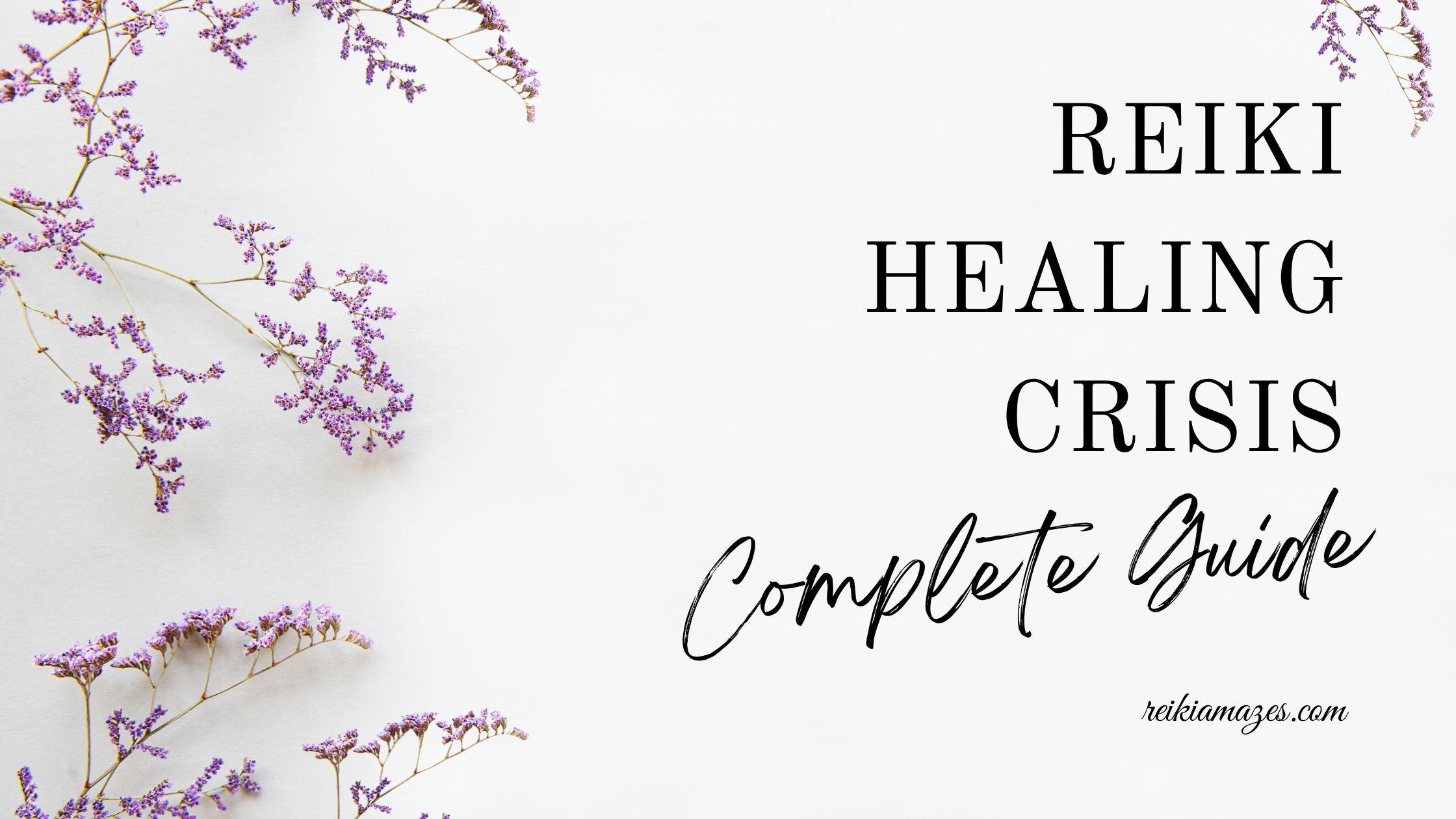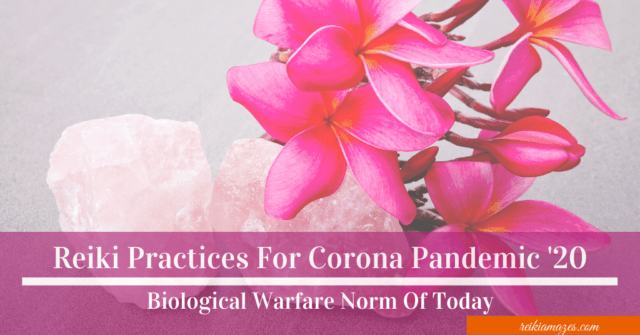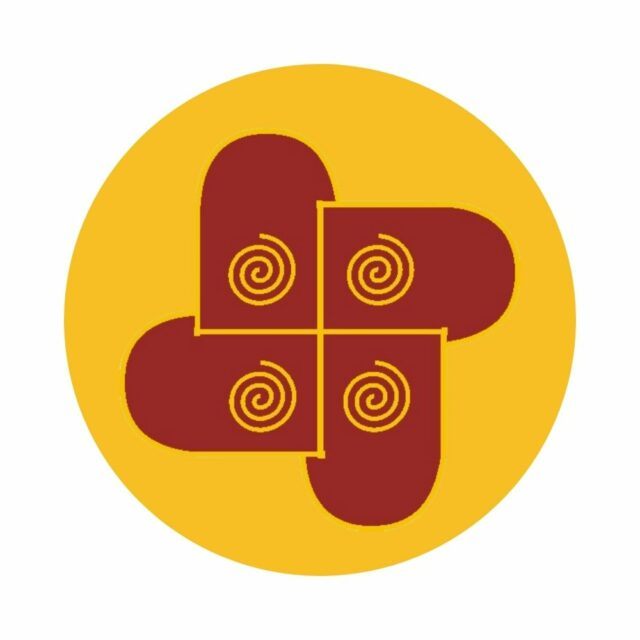When we look at holistic healing practices, Reiki stands out as a powerful and unique modality. Reiki was developed by Dr.Mikao Usui, a Japanese technique for stress reduction and relaxation that also promotes healing. It is a form of natural energy healing that taps into the body’s own healing power, helping to restore balance and well-being. While Reiki can be a powerful and transformative experience, it is important to understand the concept of a healing crisis, which is often a part of the Reiki journey. This Guide to Reiki Healing Crisis will provide you with an overview of Reiki and the concept of a healing crisis so that practitioners and recipients alike can understand the potential of this powerful healing modality.
Overview of Reiki and its Healing Properties
Reiki was developed by Dr.Mikao Usui, is a Japanese healing technique that uses energy, or “life force,” to promote relaxation, reduce stress and anxiety, and bring balance to physical, mental, and spiritual health.
Reiki practitioners direct this energy through their hands to the patient in order to activate the natural healing processes through the different points of the Reiki.
26 Reiki Points For Self Treatment – Refresh Yourself Everyday-[Updated]
Reiki is believed to balance and harmonize the body’s natural energy, creating a sense of clarity and peace. The healing process is non-invasive and is said to bring about a greater sense of well-being, relaxation, and vitality.
Explanation of the Healing Crisis
The healing crisis, also known as a cleansing reaction, is a common phenomenon that some people experience after receiving Reiki or other forms of energy healing. It occurs when the body begins to release old patterns, toxins, and emotional blockages, which can lead to temporary discomforts such as headaches, body aches, emotional release, or other symptoms.
This period is often marked by a feeling of discomfort, fatigue, or a flu-like feeling. It is important to remember that this is normal and part of a natural healing process.

Image Courtesy: Pixabay
10 Signs and Symptoms of the Healing Crisis
During the healing process, the body can often experience a healing crisis, when it is working hard to rid itself of toxins or other negative energies.
Signs and symptoms of a healing crisis can include a worsening of existing symptoms, tiredness, headache, nausea, and even fever. It is important to note that these symptoms are temporary and should pass quickly.
1. Fatigue or low energy levels
Fatigue or low energy levels can be common symptoms of the healing crisis. This happens because, during a Reiki session, the body releases negative energy and toxins which may lead to temporary exhaustion or a feeling of tiredness. It’s important to rest and allow the body to heal and adjust to the changes. It’s also recommended to drink plenty of water to flush out the toxins and maintain proper hydration levels. Additionally, proper sleep, a balanced diet, and gentle exercise may help to restore energy levels during the healing process.
2. Emotional sensitivity or mood swings
Emotional sensitivity or mood swings refer to a common symptom of the healing crisis in Reiki, which involves experiencing intense or erratic emotional reactions during or after a Reiki treatment. This can be a result of the body’s release of pent-up emotions, memories, and trauma as part of the healing process. These emotions can range from feelings of sadness, anger, fear, and even joy or happiness.
As part of the healing crisis, emotional sensitivity or mood swings can be a sign that the body is releasing and purging negative energy or emotional blockages. It is important to note that while these emotions can be intense, they are a natural part of the healing process and can lead to emotional growth and inner transformation.
It is recommended to acknowledge and allow these emotions to surface during a Reiki treatment or healing crisis, and to work with a qualified Reiki practitioner or mental health professional if necessary to process and cope with the emotions. Some coping strategies include mindfulness, deep breathing, meditation, journaling, and seeking social support.
3. Physical Aches and Pains
Physical aches and pains are a common sign of the healing crisis that can occur after a Reiki session. These physical symptoms can include muscle soreness, joint pain, headaches, and stomach discomfort.
During a Reiki session, energy blockages may be released, which can cause physical discomfort as the body adjusts to the new flow of energy. This discomfort is temporary and is a sign that the body is beginning to heal.
It is important to communicate any physical symptoms to your Reiki practitioner so that they can adjust their techniques accordingly. Additionally, it is important to take care of your body after a Reiki session by drinking plenty of water, resting, and engaging in gentle exercise to help facilitate the healing process.
4. Headaches or Migraines
Headaches and migraines can be common during a healing crisis. Headaches may range in severity and could be a sign of the body removing toxins or releasing pent-up emotions. Stress, tension, or dehydration may also lead to headaches.
Migraines are a severe form of headache that can be associated with nausea, light and sound sensitivity, and vision changes. Like headaches, these could be due to physical or emotional detoxification or stress.
It is essential to be mindful of the type, intensity, and frequency of any headaches or migraines that occur during a healing crisis, as these could suggest a need for treatment or further attention.
If the headaches or migraines are extreme or continue for a prolonged period, it is important to seek medical advice.
5. Changes in Sleep Patterns
Changes in sleep patterns can be a symptom of the healing crisis. During a healing crisis, your body may be working harder than usual to release toxins and emotional blockages. This increased activity can make it difficult to fall asleep or stay asleep, or it can cause you to sleep more than usual.
Changes in sleep patterns can also be related to the emotional release that can occur during a Reiki session. As you release emotional blockages and unresolved feelings, your body and mind may need time to process and integrate these changes, which can affect your sleep patterns.
It’s important to listen to your body and give yourself plenty of rest and self-care during a healing crisis. This may mean adjusting your sleep schedule, taking naps during the day, or practicing relaxation techniques before bed. By taking care of yourself during this time, you can support your body’s natural healing process and emerge from the healing crisis feeling more balanced and energized.
6. Digestive Issues or Changes in Appetite
During Reiki sessions, the body may expel stored toxins, which could potentially lead to a change in the digestive system. This can manifest in several digestive issues such as diarrhea, constipation, and abdominal cramps, as well as changes in appetite. This is a sign of the healing crisis, and should be monitored.
Digestive issues may occur as a result of increased metabolic activity during the healing process. Reiki can stimulate the body’s natural healing mechanisms, leading to increased circulation, lymphatic drainage, and the elimination of waste products. As the body works to release toxins, it can also produce more digestive enzymes, which can cause changes in appetite and digestion.
If you experience digestive issues or changes in appetite during a healing crisis, it is important to stay hydrated and eat a balanced diet that is rich in fiber, whole grains, and fresh fruits and vegetables. You may also consider incorporating probiotics or other digestive supplements to help support your digestive system.
7. Flu-like Symptoms or Congestion
Flu-like symptoms or congestion may manifest as a feeling of heaviness or congestion in the body, along with other symptoms such as headaches, body aches, fever, or chills.
These symptoms are often similar to those experienced during a cold or the flu, but without the actual illness. The body is releasing toxins and negative energy, and this can sometimes cause these symptoms to occur as part of the healing process.
It’s important to listen to your body and rest when you need to, as well as drink plenty of water to help flush out any toxins being released.
8. Skin Rashes or Breakouts
During a healing crisis, some individuals may experience skin rashes or breakouts. This is a common occurrence and can happen due to the release of toxins from the body during the healing process. As the body eliminates these toxins, they may be expelled through the skin, causing irritation, inflammation, and other symptoms.
The skin is an important organ of detoxification, and it plays a significant role in eliminating toxins from the body. When the body is overwhelmed with toxins, the skin may become overloaded, and this can result in rashes or breakouts.
As the healing crisis subsides, the skin will often clear up on its own, and the symptoms will disappear. However, it’s crucial to address the root cause of the healing crisis, which may include changes to diet, lifestyle, or the Reiki treatment itself.
9. Heightened Awareness of Past Traumas or Emotions
During a healing crisis in Reiki, it is not uncommon for individuals to experience a heightened awareness of past traumas or emotions. As the body and mind begin to release energetic blockages, these past traumas and emotions can resurface and be brought to the forefront of one’s awareness. This can be overwhelming and may cause individuals to experience intense emotions or physical sensations.
However, this process is an important step in the healing journey, as it allows individuals to confront and process these past traumas and emotions, ultimately leading to a sense of release and relief.
Reiki can help individuals to navigate this heightened awareness by promoting relaxation, emotional balance, and mental clarity, allowing them to confront and process these past traumas in a safe and supportive environment.
10. Intense or vivid Dreams
As a part of the healing crisis, some people may experience intense or vivid dreams. These dreams could be a result of the mind processing and releasing suppressed emotions and memories. During the dream state, the subconscious mind becomes more active and can bring up deep-seated emotions and feelings that were previously ignored or forgotten. This could be a sign that the body and mind are beginning to heal and release negativity, allowing for a more positive and balanced state of being. It is important to remember that these dreams are a natural part of the healing process and should be embraced rather than feared or ignored.
Please keep in mind that these symptoms can vary widely from person to person, and not everyone will experience all of them. If you’re unsure whether you’re experiencing a healing crisis or a medical issue, it’s always a good idea to consult with a healthcare professional.
During a healing crisis, it is important to focus on rest and relaxation, as well as drinking plenty of water and eating healthy meals. Reiki practitioners may also choose to use gentle techniques to aid the healing process, such as placing their hands on the affected area and visualizing energy flowing into the body.

Potential Causes of Healing Crisis
The healing crisis, or healing reaction, is a normal component of the Reiki healing process. It is the body’s response to the release of toxins, the re-balancing of energy, and the healing of physical, mental, and emotional traumas. Though the healing crisis is beneficial and should not be feared, it is important to understand the potential causes and effects of this process.
The four potential causes of the healing crisis are as follows:
- physical detoxification,
- mental/emotional detoxification,
- life changes, and
- spiritual healing.
Physical detoxification is caused by the removal of toxins from the body, while mental/emotional detoxification is caused by the release of past traumas, suppressed emotions, and beliefs. Life changes occur as a result of the body’s reaction to the healing process, while spiritual healing is a result of the shifts in energy, awareness, and consciousness brought about by Reiki healing.
During a healing crisis, the body, mind, and spirit are all affected. Physical detoxification refers to the release of toxins from the body, which can manifest in symptoms like nausea, headaches, and fatigue. Mental and emotional detoxification, on the other hand, refers to the release of past traumas, suppressed emotions, and limiting beliefs that can cause anxiety, depression, or other negative emotions. This release can be brought about by Reiki healing, as the body’s natural healing mechanisms are activated and begin to release these emotional blockages.
As the body and mind go through this process, life changes can occur, as the individual gains a new perspective and new ways of coping with challenges. In addition to physical and mental changes, spiritual healing can occur as well, as the individual’s energy, awareness, and consciousness are shifted by Reiki healing. This can result in a greater sense of connection to the self, others, and the universe as a whole. Overall, Reiki healing can be a powerful catalyst for transformation and growth, both on a physical and emotional level, as well as on a spiritual level.
Understanding the Positive Aspects of Healing Crisis
While the healing crisis can be uncomfortable, it is important to understand the positive aspects of the process. During a healing crisis, the body is working to rid itself of the toxins and blockages that are causing the physical, mental, or emotional symptoms.
It is the body’s way of healing itself and restoring balance. Furthermore, the healing crisis can be a powerful impetus for change, as it can motivate the patient to make healthier lifestyle choices. Understanding the positive aspects of the healing crisis can help Reiki practitioners and patients alike to embrace the process as an opportunity for growth and development.
Strategies to Cope with Healing Crisis
In our discussion of Reiki and the Healing Crisis, now we understand that the healing crisis is a necessary part of the healing process. It can be uncomfortable, but it’s also an opportunity for deeper healing. To help you through the healing crisis, here are 6 strategies you can use to cope.
1. Make Sure to Rest
The healing crisis can be draining, and rest is essential for your body’s recovery. When going through a healing crisis, it’s important to prioritize rest as part of your coping strategy. Resting allows your body to conserve energy and focus on the healing process. Getting enough sleep, taking naps, and relaxing can help your body recover and recharge. It’s also essential to listen to your body and take breaks when you need them, even if that means taking a break from your usual routine. By taking time to rest, you can support your body’s natural healing abilities and reduce the intensity and duration of the healing crisis.
2. Focus on Self-care
This can include taking hot baths or showers, eating healthy meals, and engaging in calming activities, such as meditation or yoga. When experiencing a healing crisis, it’s important to prioritize self-care to support your physical, emotional, and mental well-being.
Engaging in activities that help you relax and reduce stress can help ease any discomfort or symptoms you may be experiencing.
Eating healthy meals can help nourish your body and support the healing process. Engaging in calming activities such as meditation or yoga can help calm the mind and support emotional and mental balance. By focusing on self-care, you are giving your body and mind the support they need to navigate the healing process.
3. Stay Hydrated
Proper hydration helps the body to flush out toxins and repair itself. Staying hydrated is an important strategy to cope with the healing crisis as it helps the body to flush out toxins and repair itself.
When the body is undergoing a healing crisis, it is working to eliminate toxins, which can cause dehydration if not properly hydrated. Proper hydration supports the body’s natural detoxification process and allows the body to eliminate toxins more efficiently, reducing the symptoms of the healing crisis.
Additionally, consuming water-rich foods such as fruits and vegetables can also help with hydration and support the body’s healing process.
4. Keep a Journal
Writing down your daily experiences can provide insight into your healing process and help you identify patterns. keeping a journal is a simple but powerful way to support yourself during the healing crisis. It can help you stay grounded, focused, and self-aware as you navigate the ups and downs of the Reiki healing journey.
Keeping a journal can be an effective strategy to cope with the healing crisis in Reiki. The healing process can be a complex and multifaceted experience, and writing down your daily experiences and observations can help you track your progress, gain insight into your healing process, and identify patterns.
By keeping a journal, you can record your thoughts, feelings, and physical sensations, as well as any significant dreams or insights that may arise during the healing process. This can help you better understand the underlying emotional or mental issues that may be contributing to your symptoms and allow you to work through them more effectively.
5. Connect with Others
Reaching out to supportive friends, family, and a therapist can help you process the healing crisis. Connecting with others is an important strategy for coping with the healing crisis, as it can help you process your experiences and gain support.
Sharing your feelings and experiences with supportive friends, family, or a therapist can provide you with a safe space to explore and express your emotions.
It can also help you gain perspective and insights into your experiences, and provide you with the reassurance and encouragement you need to move forward. This can be particularly helpful during times of emotional upheaval or when you feel overwhelmed by the changes you are experiencing.
6. Practice Mindfulness
Acknowledge and accept your feelings without judgment. Focusing on the present moment can help you find peace. practicing mindfulness involves being fully present and aware of your thoughts, feelings, and sensations in the moment without judgment.
It means acknowledging and accepting your emotions and thoughts without labeling them as good or bad. This practice can help you cope with the intensity of the healing crisis by reducing stress and promoting relaxation.
Mindfulness can also help you gain clarity and insight into your inner self, which can facilitate your healing journey. Overall, practicing mindfulness is a powerful tool for coping with the healing crisis and promoting overall well-being.
Potential Beneficial Effects of the Healing Crisis
The healing crisis is a natural part of the Reiki healing process that can have a variety of potential beneficial effects. It is possible to experience heightened emotions, physical exhaustion, and the emergence of suppressed memories during this process.
The healing crisis can be a discomforting experience as the body and mind adjust to the shifts and changes brought on by Reiki healing. However, it is important to understand that this process can ultimately lead to a greater sense of well-being and balance. Through the removal of toxins from the body and the release of long-term emotional and mental blockages, an individual can experience a significant improvement in their overall health and mental state.
In addition, the healing crisis can bring about an increased sense of clarity and self-awareness, allowing individuals to better understand and connect with their emotions and experiences. Though discomfort may arise during this process, it is important to trust in the body’s ability to heal and to approach the experience with an open and accepting mindset. Ultimately, the healing crisis can serve as a powerful catalyst for positive change and transformation.
When to Seek Medical Advice
Reiki is generally considered safe and mild, but there may be certain situations where it is best to consult with a medical professional before receiving a Reiki treatment.
If you have a physical health condition or are taking medication, it is important to speak with your doctor before receiving Reiki.
Reiki practitioners should always be informed of any physical or mental health conditions a client has, in order to provide the best possible treatment.
Reiki Practitioners’ Role in Managing Healing Crisis
Reiki practitioners play an important role in managing the healing crisis, which is the concept of healing being a process that involves the body, mind, and spirit.
When undergoing Reiki treatments, the body will sometimes respond with a period of discomfort due to the release of toxins, both physical and metaphysical, as well as repressed emotions.
Reiki practitioners can guide clients through the healing crisis, helping them to understand and manage the process while maintaining a safe, supportive environment.
Reiki practitioners can also provide advice and assistance to help people cope with the physical and emotional changes that may accompany the healing process.
Conclusion
Reiki is a powerful healing tool that can help facilitate a healing crisis. Through the use of Reiki, individuals can work on releasing energetic blockages and physical and emotional issues.
It’s important to remember that these experiences are completely normal and even beneficial. A healing crisis can be a sign that the body is responding to the Reiki healing energy and is working to release toxins, emotions, and past traumas.
Remember that Reiki practitioners are trained to support you through any experiences that may arise during a healing session. They will work with you to ensure that you are comfortable and safe, and they can offer guidance and coping strategies to help you manage any discomfort.
If you’re considering a Reiki session, don’t let the possibility of a healing crisis hold you back. Instead, see it as a sign that the energy is working and that you are on the path to greater well-being and balance.
Embrace the process, and trust that you will emerge from the healing session feeling renewed, refreshed, and more connected to your inner self. Give Reiki a chance to help you achieve the inner peace and harmony you deserve.
A Reiki session can leave you feeling revitalized, rejuvenated, and deeply connected to your true self. It is a powerful tool that can help you achieve inner peace and a greater sense of well-being. Trust in the process and allow Reiki to guide you on your journey toward healing and self-discovery.
Reiki Blessings…
















